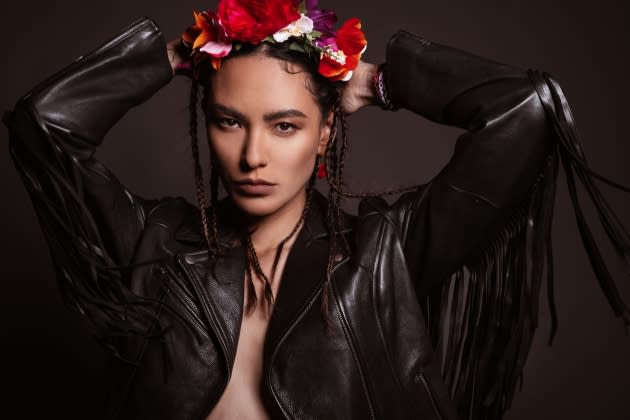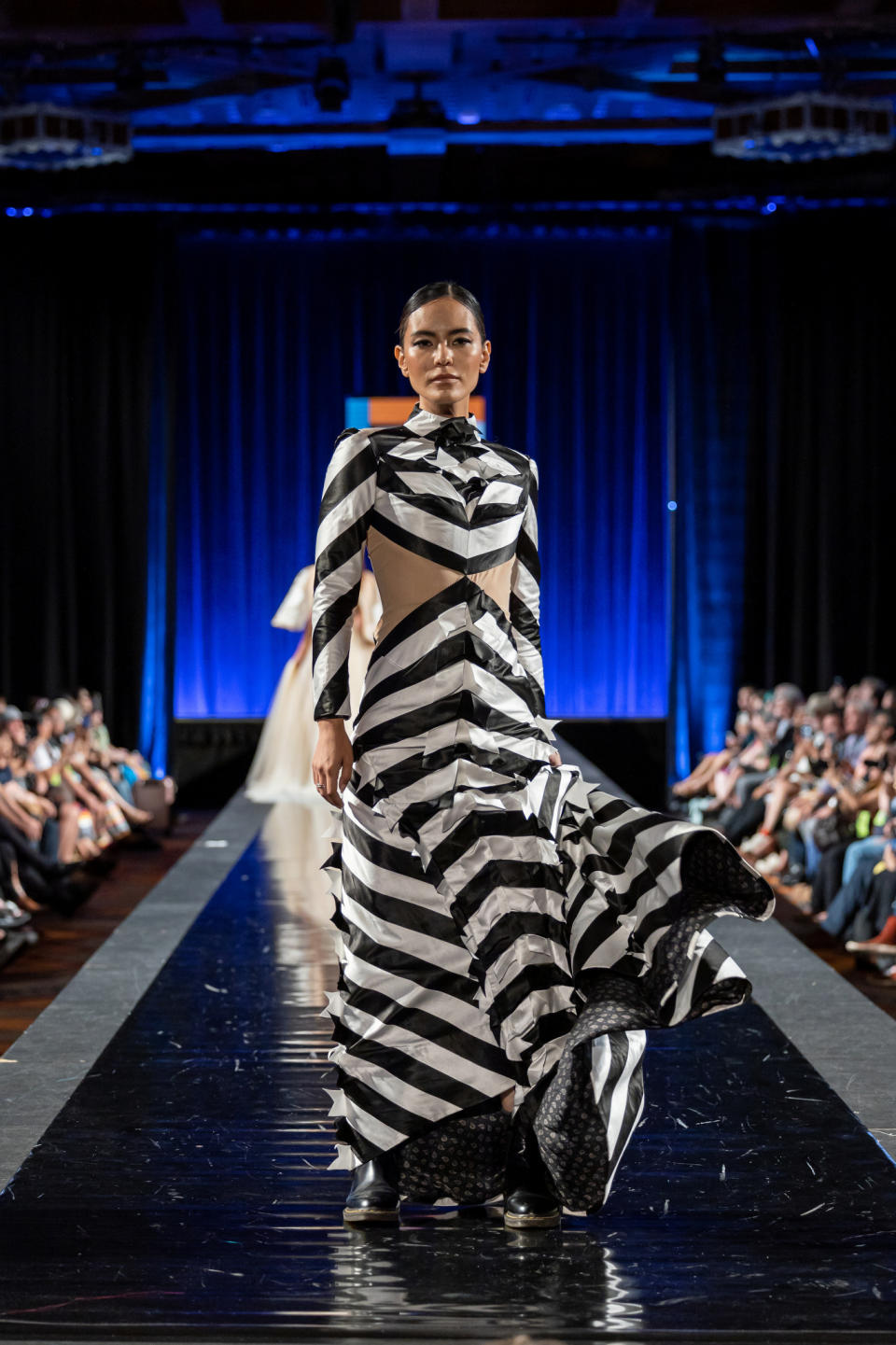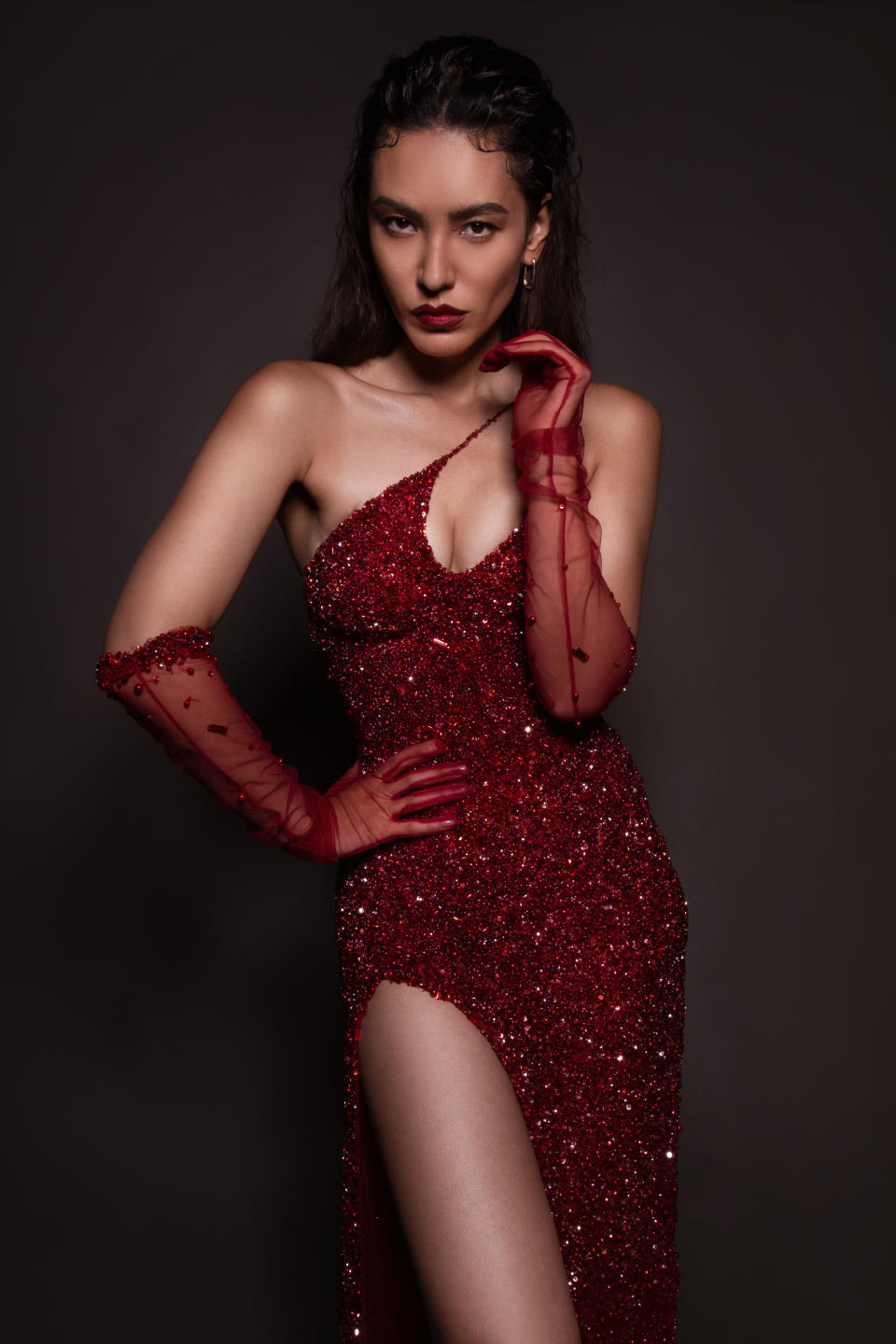‘Dark Winds’ Jessica Matten: “My Entire Life’s Purpose Is to Empower Women’
- Oops!Something went wrong.Please try again later.
- Oops!Something went wrong.Please try again later.
- Oops!Something went wrong.Please try again later.

To say Jessica Matten is impressive is an understatement.
Barely 48 hours after she walked the runway at Santa Fe’s Indigenous Fashion Show, the Indigenous Canadian actress is in Alberta, Zooming in from the Indigenous Film Academy she helped open last June on Siksika Nation, where she spent part of her growing up.
More from WWD
“I’m with the res dogs, literally,” she laughs, turning the camera around to reveal two hounds napping in the afternoon sun.
Matten moved to Los Angeles in late 2019, but has spent a lot of time in and around Santa Fe filming “Dark Winds,” the AMC series produced by George R.R. Martin and Robert Redford, based on the Leaphorn & Chee novels by Tony Hillerman.
She plays Bernadette Manuelito, the only female police officer on the Navajo reservation in the ’70s-set psychological drama, whose appreciation for tradition ends up being an asset. The series is wrapping shooting its second season.
“We had a lot of blessings from the Navajo Nation,” she says. “It was the first time that they allowed any film production to come in and shoot there.”
Being at Santa Fe’s Indian Market “touched my heart,” says the first-timer. “I was so lovingly slammed with young women and girls coming up expressing that they were fan way, which also had “Dark Winds'” Zahn McClarnon, Eugene Brave Rock and Kiowa Gordon modeling. “I think as Indigenous people we are supportive of one another.…I’m very conscious if I have press to always reach out to my Indigenous brothers and sisters; I want to wear other designers, too, but I always want a piece, or an accessory that’s representative of my culture.”

Courtesy of Tira Howard
Lately, she’s been wearing jewelry by Dale Waseta Flowingstone, a “Dark Winds” crew member who handpicks turquoise stones on sacred Navajo land, and says prayers when he chooses them. “I believe in the energy he puts in there. It is good medicine,” she says.
But Matten is leery of “stereotypical Indigenous design,” she says. “That goes for my branding and logos. I respect it, but I personally don’t want to wear feathers. I don’t want to wear tipis, buffalo or eagles. I don’t want that because if I’m serious about moving my people forward, I want my fashion to be a representation of that as well. Humanizing Indigenous people means we can wear designer brands and still know who we are. I’m 100 percent proud of my culture, no matter what I wear.”
A member of the Metis Nation, she grew up adjacent to fashion, watching her mom run one of the first Native modeling schools, in Alberta. Her mother employed several women coming out of domestic abuse situations, which taught Matten early on the value of fighting for social justice.
“I’m tall, I’m 5’10,” so they would always throw me into shows here and there,” she says, confessing that she was so enamored of the glossy world, but also cash strapped, that she sometimes ripped the plastic off Vogue Italia to steal the pamphlet version inside.
Alexander McQueen, Jacquemus and Balenciaga are favorites, she says, describing her style as masculine-meets-feminine. “My dream is to do a collection with a couture designer and maybe an artist like Jamie Okuma, be the face of it and have the proceeds go back to my film academy and preventing Native suicides,” she says.

Courtesy/Crystal Tsang
Her path to Hollywood was winding; she studied human ecology, then worked in advertising in London, near the McQueen studio. She remembers bumping into the late designer and being so flustered, she spilled coffee all over herself. She briefly considered fashion styling, too. Then, when the recession hit, she moved back to Canada to try the entertainment business.
She broke through in 2016 in Netflix’s “Frontier,” with Jason Mamoa, then produced and starred in “Tribal,” which debuted in 2020 on the Aboriginal Peoples Television Network in Canada.
Matten has been working with Native communities on the side for 25 years, in suicide prevention and addiction counseling, with a focus on youth. “We have 11-year-olds killing themselves each month on every reservation. We have to empower them with employment.”
That’s what fuels her work in entertainment, and it’s where her Indigenous Film Academy comes in. Launched in June in partnership with Old Sun College, the academy has 20 students graduating next month, some of whom Matten has already secured jobs for in the industry. They were each paid $2,500 to attend the school.
She wants to continue inspiring audiences by telling Native stories.
Through her production company, 7 Forward Entertainment, Matten is developing a TV series about an Afro-Indigenous rapper. With business partners Michael B. Clark (Big Beach Films), Sanjay Rawal and Ryan Kampe, she’s working on a feature film about Mi’kmaq long distance runner Patti Dillon, the first athlete to be sponsored by Nike.
With the success of “Dark Winds,” “Reservation Dogs” and “Rutherford Falls,” Hollywood seems finally to be receptive to Native-produced content.
“Amber Midthunder is my little sister in this industry and the success of ‘Prey’ is that it’s essentially a monster film that happens to have Indigenous characters. And what that proves to studios is we are bankable. That’s a huge win for our entire community, just as ‘Dark Winds’ is,” she says, stressing the need to keep the momentum going. “I think eventually this is going to be normalized. Then we will hopefully become a part of mainstream society and accepted as such.”
Best of WWD
Sign up for WWD's Newsletter. For the latest news, follow us on Twitter, Facebook, and Instagram.

